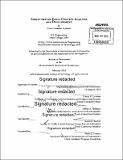Safety-driven early concept analysis and development
Author(s)
Fleming, Cody Harrison
DownloadFull printable version (16.09Mb)
Other Contributors
Massachusetts Institute of Technology. Department of Aeronautics and Astronautics.
Advisor
Nancy G. Leveson.
Terms of use
Metadata
Show full item recordAbstract
As aerospace systems become increasingly complex and the roles of human operators and autonomous software continue to evolve, traditional safety-related analytical methods are becoming inadequate. Traditional hazard analysis tools are based on an accident causality model that does not capture many of the complex behaviors found in modern engineered systems. Additionally, these traditional approaches are most effective during late stages of system development, when detailed design information is available. However, system safety cannot cost-effectively be assured by discovering problems at these late stages and adding expensive updates to the design. Rather, safety should be designed into the system from its very conception. The primary barrier to achieving this objective is the lack of effectiveness of the existing analytical tools during early concept development. This thesis introduces a new technique, which is based on a more powerful model of accident causality that can capture behaviors that are prevalent in these complex, software-intensive systems. The proposed approach builds on a new accident causality model, called Systems-Theoretic Accident Model and Process, developing a methodology on the model so that it can be applied during the early concept development stages of systems engineering. The goals are to (1) develop rigorous, systematic tools for the analysis of future concepts in order to identify hazardous scenarios, and (2) extend these tools to assist stakeholders in the development of concepts using a safety-driven approach. This work first develops a methodology for hazard analysis of a concept of operations (ConOps) using control theory to generate a model of that ConOps. Formal, systems-theoretic concepts such as hierarchy, emergence, communication, and coordination are used to analyze the model and identify hazards in the concept. These hazardous scenarios then guide the development of requirements and the generation of a system architecture, defined as a hierarchical control structure. This model-based approach represents a significant departure from the state of the art; in the new approach a concept is defined, developed, and analyzed according to a control theoretic model rather than free form, natural language text. The power of the proposed approach-called Systems-Theoretic Early Concept Analysis-is demonstrated on a concept currently being developed by the United States Federal Aviation Administration.
Description
Thesis: Ph. D., Massachusetts Institute of Technology, Department of Aeronautics and Astronautics, 2015. Cataloged from PDF version of thesis. Includes bibliographical references (pages 180-188).
Date issued
2015Department
Massachusetts Institute of Technology. Department of Aeronautics and AstronauticsPublisher
Massachusetts Institute of Technology
Keywords
Aeronautics and Astronautics.